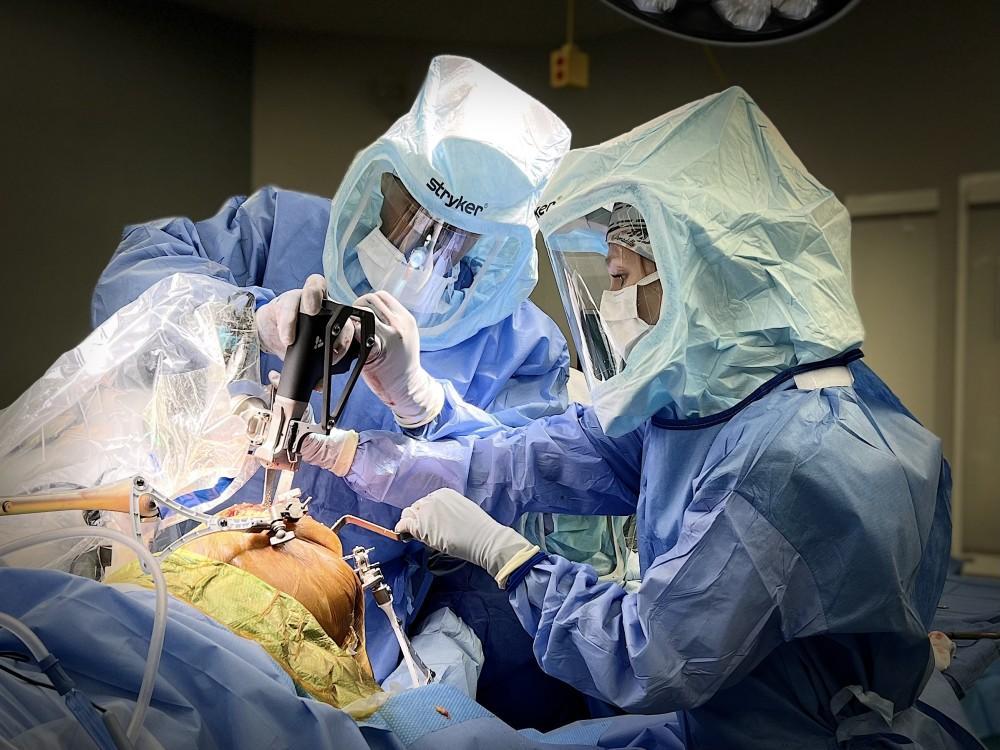
Knees, Hips and other tips: Should I consider trading in my old joints for something shiny and new?

Will a total hip and knee replacement benefit me?
Initially, treatment of arthritis begins with non-surgical routes: from over-the-counter pain relievers like anti-inflammatory medication to use of assistive devices such as a cane. If the pain persists in spite of these treatments, surgery may be your best bet. Arthritis of the hip and knee are ailments commonly associated with aging, which can also psychologically weigh on a person. Given the costly expenses associated with surgery, it is important to assess the quality of life pre-operation and post-op. You can only stand to gain from surgery in the long run; no more canes and recurring drug expenses! Luckily for those in need of surgery, hip and knee replacements are very successful. Healing varies for patients, but post-surgery should leave you feeling like your old and youthful self. In this way, your heightened mobility will advance your health in general.
My joints are in bad shape, should I schedule a surgery?
When your arthritis starts to prevent you from doing standard everyday things, it is imperative to consider scheduling an appropriate time to take care of your debilitating handicap. Those with hip and knee arthritis suffer from pain and mechanical disabilities. As arthritis worsens, the joints affected can develop stiffness which can lead to a more difficult surgery. Complications in surgery can lead to long recovery time and copious amounts of physical therapy. If the arthritis is severe, joint flexibility may never be restored to normal levels even after surgery. Putting off a much-needed surgery, may result in only moderate benefits after your hip and knee replacements.
What technology should I anticipate the surgeon to use?
There are many ongoing studies evaluating modern technologies and their role in successful surgeries. Although there are several marketing strategies directed at potential consumers about modern surgical techniques, its best to discuss with your surgeon. It is vital to know if the surgeon uses any of these tools, if/why they like them, and their reviews on the equipment in question.
Hospital stay, recovery and rehab: what should I expect?
Your stay in the hospital is typically less than 1 to 2 nights, with factors depending on both rehab protocols and progression with your physical therapy. Also consider your condition before surgery, age and any ongoing medical problems- these can add or subtract the time for your recovery stage. When discharged, your rehab plan will be tailored to the operation and your overall health. In general, it is best for you to go home rather than to a facility after surgery.
Recovery begins immediately after surgery. On average, patients have one or two sessions of physical therapy in a day while in the hospital. Therapy is necessary to strengthen muscles and general mobility; these sessions also promote safety when you are discharged, safe and at home. Mundane activities such as showering, dressing, and climbing stairs must be done with the utmost caution. Mobility after surgery is necessary to avoid bedsores, pneumonia, and blood clots.
With surgery, can I hope to hop again?
People tend to get better within six weeks post-op. Skin incisions take around 2-3 weeks to heal. Walking without the assistance of a cane and driving will vary in time tailored specifically to the individual. Physical therapy is paramount once you are done with surgery, especially after knee replacement surgery. Healing can take a full year given that scar tissue takes a little while longer to soften; overall, you will exponentially get better as time progresses. After the pain subsides, you will notice an improvement in your motor skills. The quality of the replacement will depend on several factors: age and activity level being the main variables. Studies have shown that those who have replaced their arthritic hips and knees feel good as new even twenty years post-op!
How necessary are follow-ups after sporting my new knee and/or hip?
Parts may become loose with new replacements, joint surfaces may wear, bone could break, and infection are all things to consider. In this case, scheduling regular check-ups is a priority no matter how able and well you tend to feel. If problems occur during diligent monitoring of new joints, treatments won’t be too much of a hassle. Ignoring any issues will certainly heighten the damage in the long run.
Dr. Ugo Ihekweazu, is an orthopedic surgeon and an expert in Hip and Knee Replacement surgery in the Greater Houston Area. Dr. Ihekweazu is a member of the Fondren Orthopedic Group with offices in the Texas Medical Center and Willowbrook/Cypress. As one of the top young surgeons in the country, Dr. Ihekweazu has particular expertise in minimally invasive anterior and posterior total hip replacement surgery, hip resurfacing, partial knee replacement, minimally invasive total knee replacement surgery, computer navigation, robotic-assisted surgery, complex joint replacement and revision joint replacement surgery. If you have further questions about any of these surgical options please contact us today to make an appointment.
You Might Also Enjoy...


Robotic-Assisted Knee Replacement Surgery

100 Velys Robotic-Assisted Knee Replacement Surgeries

Texas Orthopedic Association Annual Meeting

DePuy Velys Robotic Assisted Knee Replacement Surgery



